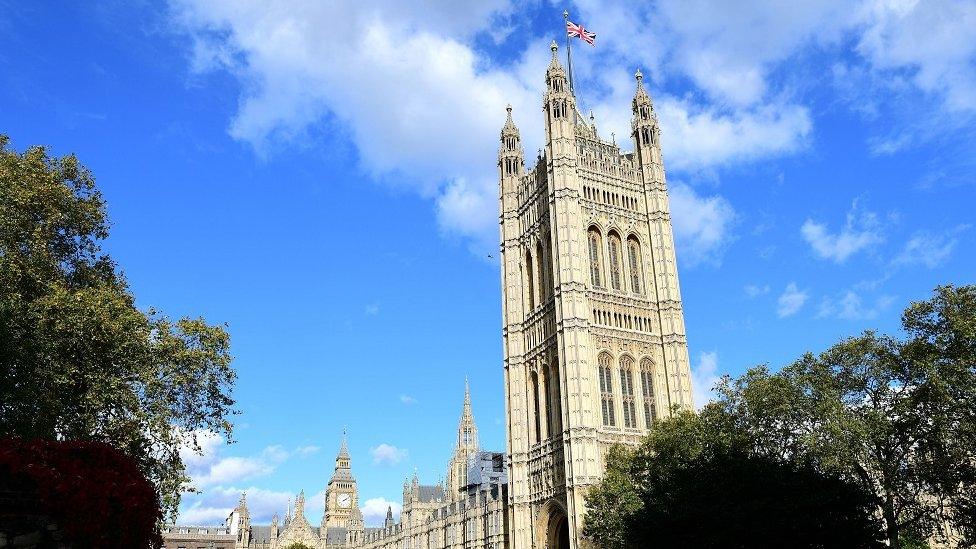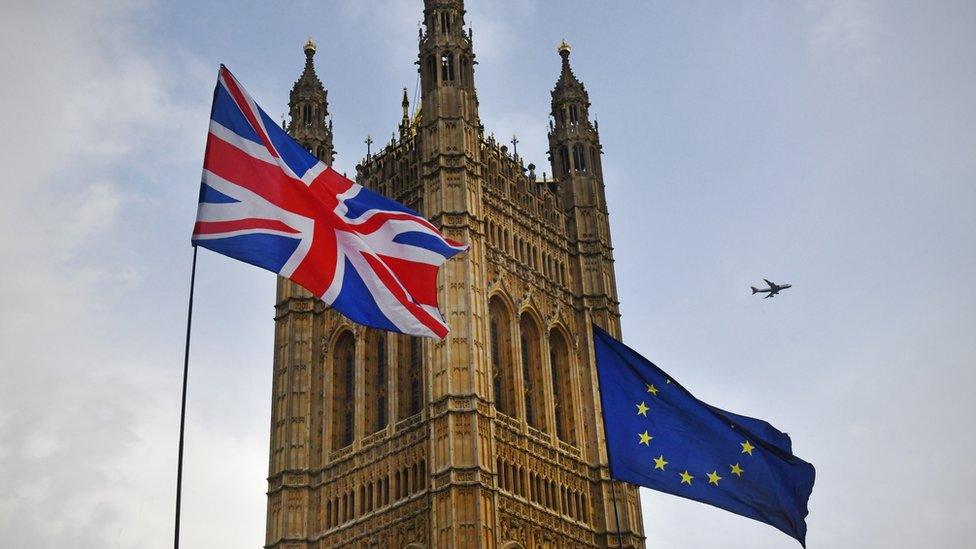What's happening in Parliament this week?
- Published

All quiet on the Commons front; plenty of action in the Lords.
Fresh from defeating the government over the Economic Crime Bill, the Retained EU Law Bill and the National Security Bill last week, peers prepare to sink their teeth into the Illegal Migration Bill and the Northern Ireland Legacy Bill.
There will also be more "ping-pong" votes on the various bills currently bouncing between the two Houses.
So far Noble Lords have been reluctant to back down on the two remaining issues on the Retained EU Law Bill.
Normally the steam seeps out of their defiance after MPs have rejected their changes a couple of times. But maybe anger over the handling of new public order offences around "slow walking" protests, brought in as secondary legislation after peers had rejected including them in a bill has put iron in their souls.

Unless Labour can come up with some cunning wheeze to force a bit of controversy into their Opposition Day debate on Tuesday, MPs will have a quiet week ahead.
They compensate a bit with some interesting select committee action. The big four supermarket bosses, due before the Business Committee on Tuesday can expect some accusations of "greedflation" price gouging.
But this looks like a week where MPs can campaign in the assortment of by-elections now under way, or on the home front in their own constituencies.
Monday 26 June
Commons: (14.30 BST) Defence Questions, with any urgent questions or government statements following at 15:30.
The Main Debate will see MPs consider Lords amendments to the Financial Service and Markets Bill. Peers voted to add financial inclusion and conservation of the environment to the regulatory duties of the Financial Conduct Authority.
There are also Lords amendments the National Security Bill. One requires political parties to make an annual statement to the Electoral Commission on donations received from a foreign power, directly or via an intermediary. The second extending the remit of the Intelligence and Security Committee to cover issues with security implications in all government departments.
Westminster Hall: (16:30)MPs debate two e-petitions on road use charging and Ultra-low emissions zones. First there's e-petition 599985, "Revoke local government powers to charge CAZ, LEZ, and ULEZ," which argues that local government should not have the power to introduce charges tied to public road usage. It attracted 55,520 signatures.
Alongside that there's e-petition 633550. This is aimed the Mayor of London and calls for Parliament to amend the 1999 GLA Act to remove the mayor's power to impose road use charges. It argues that the mayor's proposed extension of ULEZ could negatively impact millions of people and businesses. It attracted 26,123 signatures.
Committees: Justice (14:30) hear from specialist lawyers about the government's decision to extend the use of video-recorded evidence to many more witnesses in rape and other serious sexual offence cases.
Lords: (14.30) Is day two of report stage consideration of the Northern Ireland Troubles (Legacy and Reconciliation) Bill. At least two major votes are expected - the first on Baroness O'Loan's amendment which would delete the clause that prohibits all existing and future inquests, investigations and inquiries into the deaths resulting directly from The Troubles.
Then former Northern Ireland secretary Lord Hain's amendment to reshape the investigation along the lines of Operation Kenova, which examined claims of security force collusion in murders.
Tuesday 27 June
Commons: (11.30) there's Justice Questions, followed by a Ten Minute Rule Bill by ex-Conservative Andrew Bridgen, who has now switched to the Reclaim Party. He proposes a bill to band social transition practices in schools and require schools to inform parents if their child intends to transition or has started to.
The main event is the Opposition Day debate. In recent weeks Labour have found ways to ensure the government cannot simply ignore the debate, often forcing a vote. For example with motions to take control of the Order Paper to bring in a bill on some contentious issue.
Westminster Hall: Conservative Giles Watling leads a debate on the import and sale of fur (09.30). Sir John Hayes leads a debate on the impact of immigration on population growth (16.30).
Committee: Educations (10.00) questions Schools Minister Nick Gibb for the last session of its inquiry into persistent absence.
Health and Social Care (10.00) questions Dignitas about the provision of assisted dying/assisted suicide services to UK citizens who travel to Switzerland.
Business and Trade (10.10) has the big four supermarket bosses in to discuss rising food and fuel prices.
Lords: (14.30) Peers process Commons Amendments to the Social Housing (Regulation) Bill. That's followed by the Report consideration of the Economic Crime and Corporate Transparency Bill. Conservative former Treasury Minister Lord Agnew has a number of toughening up amendments. For example, he will propose requiring companies to disclose whether their shareholders are acting as nominees to protect the identity of the beneficial owner.
Wednesday 28 June
Commons: (11.30) Scotland Questions, followed, at Noon, by Prime Minister's Question Time.
Then it's a Ten Minute Rule Bill by Labour's Liam Byrne, who proposes a measure on Global Climate and Development Finance.
The main debate is the Second Reading of the Holocaust Memorial Bill.
This allows the planning process to begin on the Cameron-era proposal for a Holocaust Memorial Centre adjacent to Parliament, in Victoria Tower Gardens. At the moment there is a legal ban on building on the park, dating back to 1900. This bill would set it aside. But the plan is controversial, with a number of senior figures objecting that it is the wrong scheme in the wrong place.
If approved the bill would go through the "Hybrid" process. This requires consultation with the private individuals whose interests would be affected, including local people who would lose the use of part of the park. Backers of the scheme like the senior Conservative Bob Blackman are keen that the centre should be open in time to be visited by survivors of the Holocaust.
There's also a slot set aside for consideration Lords amendments to one of the number of bills in play between the two Houses of Parliament.
Westminster Hall: There are several interesting looking debates. The first the SNP's Martin Docherty-Hughes on mortgage prisoners (09.30). Then the Green Party's Caroline Lucas on the environmental impacts of Rosebank oilfield (11.00). Then former Conservative Leader Sir Iain Duncan Smith on the anniversary of the Hong Kong National Security Law (14:00).
Committees: Women and Equalities (15.00) question major record label executives from Universal, Sony and Warner. Together they account for 70% of the global recorded music market. The committee wants to ask what they're doing to tackle misogyny in music, as part of its umbrella inquiry into preventing violence against women and girls. They will cover the use of non-disclosure agreements and the way they respond to allegations of discrimination or abuse against women.
Before that the Health and Social Care (10.05) questions vaping industry representatives, following a rise in the number of children using e-cigarettes.
Lords: (15.00) It's day one of Report on the Illegal Migration Bill. This has had a pretty frosty reception from peers in earlier debates and several votes are expected. There's a front bench Labour attempt to add a "sunset clause" to time limit the provisions of the Bill. Labour's Lady Chakrabati fronts a cross party amendment on compatibility with international law. Labour's Lord Hunt and Crossbencher Lady Buttler-Sloss have an amendment to protect potential and recognised victims of trafficking from detention or removal. If time allows there might be a further vote on campaigner Lord Dubbs amendment on the treatment of child migrants.
More votes will follow in the next two days of Report Stage, on Monday 3 July and Wednesday 5 July.
Thursday 29 June
Commons: (09.30) Business and Trade Questions, followed by the weekly update on the forthcoming Commons agenda, from the Leader of the House.
Then it is on to Backbench debates. First on the fishing industry, led by Lib Dem Alistair Carmichael, who wants to highlight the continuing challenges to the industry.
This is followed by a debate on artificial intelligence. Former Digital Minister Matt Warman wants to give MPs a chance to discuss the challenges and opportunities or an all-embracing technological revolution.
The Adjournment sees Conservative backbencher David Davis on Lawfare and its impact on open and democratic freedoms: always worth watching.
Westminster Hall: Conservative Dr Caroline Johnson leads a general debate on e-cigarette. Then Andrew Selous follows with a debate on bladder and bowel continence care.
Lords: (13.30) Debates on subjects raised by backbench peers. First on violence against women and girls in the UK. Then on progress on NHS eating disorder services . Finally peers will discuss economic growth, inflation and the need to increase productivity.
Friday 30 June
Lords: (10.00) Peers debate three reports by their select committees, opening with Fighting Fraud: Breaking the Chain. This report is from Digital Fraud Committee, headed by Baroness Morgan of Coates, the Conservative former Treasury minister. With fraud now amounting to 41% of crimes against individuals. The committee found it was "under-prioritised" by law enforcement and recommended creating a Cabinet sub-committee to coordinate countermeasures from the top of government. These should include a consumer awareness campaign and measures to slow down online payments to give people a chance to have second thoughts
Second is a debate on the report from the International Relations and Defence Committee titles 'UK defence policy: from aspiration to reality?'. The report said the UK's current strategic policy lacked "clarity or purpose", and complained of a "strategic vacuum" around policy on China,
Finally, peers debate the Constitution Committee report on the Roles of the Lord Chancellor and the Law Officers. This said they should have the character, authority, intellect and independence to stand up to cabinet colleagues and the prime minister and defend the rule of law.
Related topics
- Published15 May 2023

- Published25 May 2023

